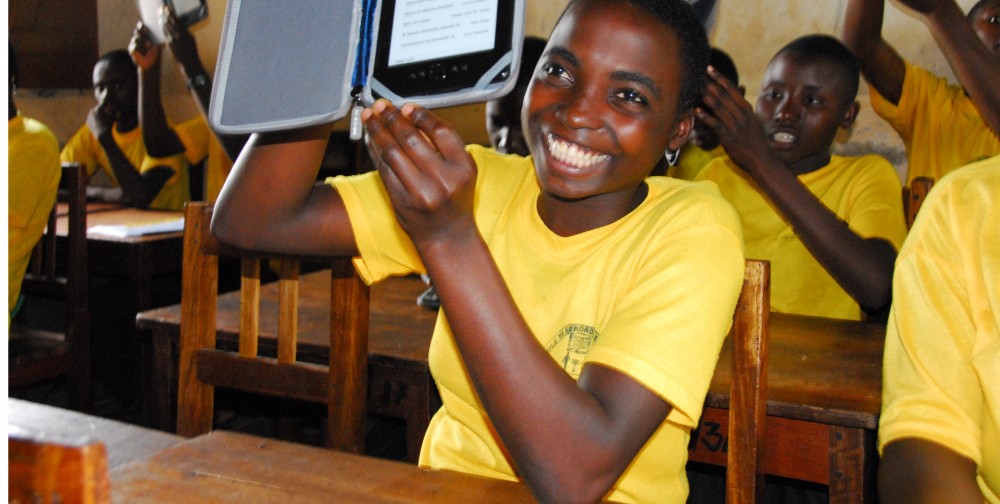In 2013 our Learn Lab teamed up with UNHCR’s Education unit and Worldreader to find innovative ways to foster a culture of reading and cost effectively get large quantities of books to refugee children in schools that often had few. We decided to go digital, using Worldreader’s approach to providing millions of students in sub-Saharan Africa access to books by distributing e-readers.
Since the project launched in 2014, the project has made some great progress. To measure the project’s impact, we tested students’ literacy on a monthly basis and also measured their exam results compared with those from last year. The plan now is to create a monitoring and evaluation framework that will rigorously assess how digital reading programs contribute to students’ learning outcomes. Last month, Joan Mwachi-Amolo of Worldreader completed a monitoring visit to Tanzania. We had a chance to sit down with Joan to get a bit more insight into how the project has advanced and what’s next.
Learn Lab: Can you describe the testing plan for utilizing the eReaders in the region?
Joan: The testing plan consisted of two key phases. The first phase of the plan, and the first year of implementation, was focused on applying Worldreader’s e-reader proof of concept, established in non-refugee settings, to refugee settings. The goal of the first phase was to collect two sets of learnings that would form the foundation for phase two and beyond. Those learnings were: 1) operational learnings concerning the proper administrative and project management structures to drive adoption; and 2) preliminary impact learnings, involving the contribution of e-readers in improving students’ performance based on teacher and student interviews, focus groups and school exams.
The end of the first phase was marked by a monitoring visit. Data collected from the visit would inform the second phase, which focuses on more refined assessments. The plan is to create a monitoring and evaluation framework that will rigorously assess, both qualitatively and quantitatively, how digital reading programs contribute to students’ learning outcomes. Phase two will also help identify key operational practices to implementing a successful e-reading initiative in refugee settings.
Learn Lab:During your most recent monitoring visit – what were some of the biggest changes you recognized within the schools?
Joan: Students’ spoken English and confidence levels both increased noticeably. Students were able to express themselves and articulate their concerns better than they could last year. These improvements correlated with their exam performance. Alex Mtole, a student from Mishamo Secondary School Form 4, put it simply: “I use the device all the time. I really like the dictionary. I have learned how to speak English better. I am doing better in my exams.”
Learn Lab: What surprised you the most about how the eReaders were being used?
Joan: We were pleasantly surprised by the positive effect of e-readers on girls and in fact, entire communities.
At the schools in Mishamo and Katumba, girls borrowed e-readers just as much as the boys, a ratio of almost 1:1. At the schools in Mwangaza and Nsimbo, the boys borrowed about five times more than the girls, which the girls explained was mostly due to the no take home policy. They stated that although they have chores once they get home, they would be willing to read later in the evening, if their parents would allow them. These preliminary findings show that e-reader programs have significant potentials in terms of positive effects on girls.
The e-reader project also facilitated access to books to both public and settlement schools. Including public schools in the e-reader project positively contributed to the goal of integrating newly naturalized Tanzanians with indigenous Tanzanians.
We believe that both of these findings have broader positive effects and should be studied further to implement efforts that would help e-reader programs reach maximum potential.
Learn Lab: What is the biggest obstacle that still needs to be overcome?
Joan: From our years of experience working in different settings, we know that there are different content needs in different settings.
The data we have collected so far has given us valuable insights into the needs and preferences of students in refugee settings. The next steps for us are to continue to 1) build our digital library to ensure titles most interesting and suitable for these students and teachers are available so that we continue to improve learning outcomes and love for reading; and 2) introduce new types of content to students and teachers to help them discover books they might overlook otherwise. These efforts will enable us to further drive adoption and build a reading culture.
Learn Lab: What’s next for the project and for WR?
Joan: Worldreader will continue to work with UNHCR to develop phase two of the test plan as well as test a range of different digital education tools with the goal of enhancing learning outcomes (especially by building partnerships with other important stakeholders). There are other applicable tools that are readily available and well-tested for other contexts. For example, Worldreader Mobile is a reading application optimized for inexpensive phones that enables digital reading for children, families and adults on devices they already own. Children and parents can use it to access reading materials at home, and mothers and caregivers can access critical health information for themselves and their families. Combined with relevant and engaging content and its enormous organic scaling capability, Worldreader Mobile has the potential to be a transformational tool for reading and literacy in the fast growing refugee settlements across the world. Overall, Worldreader is committed to working with UNHCR to identify, and subsequently implement, programmatic components that would deliver the best educational benefits.
For more information on Worldreader go to their website: www.worldreader.org
If you’d like to repost this article on your website, please see our reposting policy.

